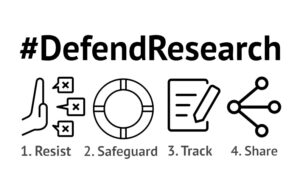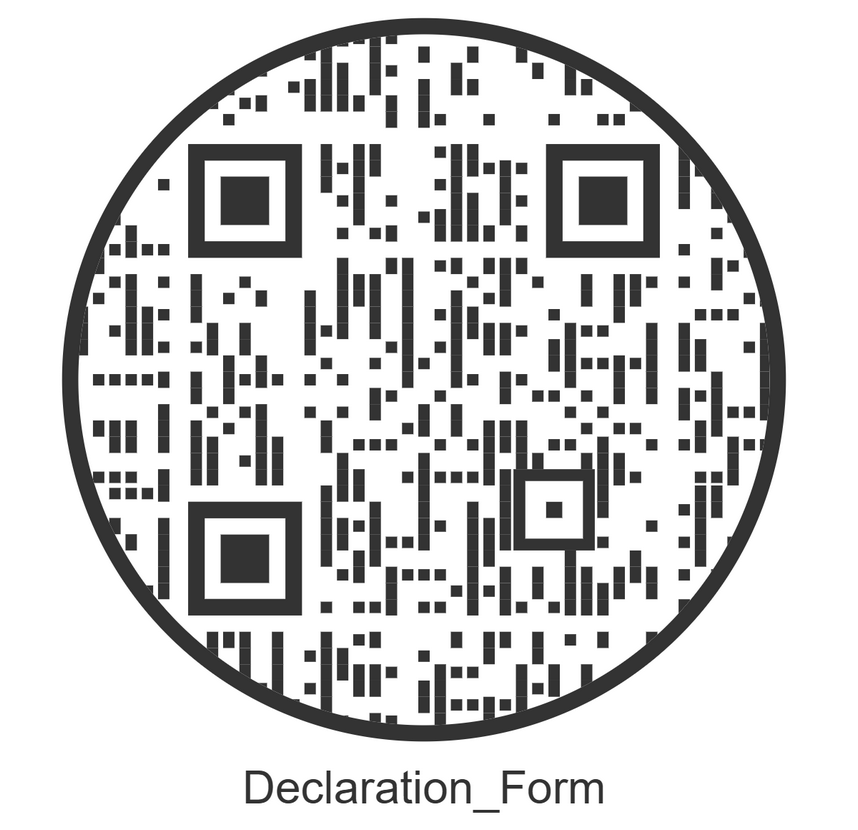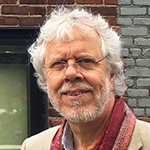By Jan Velterop

Image: Montage made using graphic elements from the #DefendResearch site.
Recently, the government of the United States of America (USA) has frightened the scientific community—not just in the country but globally—by censoring terms used in scientific communications and funding proposals. as well as forbidding researchers to communicate with one another, particularly with foreign scientists. A partial list of forbidden terms in scientific publications and research proposals is shown in the notes.1,2
It seems unlikely that this applies to all disciplines; technical and engineering disciplines may not be affected. Most of the attention of the government’s censoring efforts seems to have been directed to the areas where ideological contention is present, such as medical and life sciences, environmental and climate sciences, and social sciences. The list of censored terms seems to corroborate that.
The idea that this is just relevant to American scientists or scientists from elsewhere working in America is not correct; with researchers the world over being affected. In the Netherlands, for instance, some researchers monitoring the state of forests worldwide, with the help of satellites, have received email messages, ostensibly from the USGS (United States Geological Survey) and labelled “High Priority”. A list of questions was attached with the request to respond with answers within a week of receiving the email. The USGS indicated that sending these messages had been ordered by the United States Office of Management and Budget (OMB).
A sample of the 36 questions asked in the email (paraphrased):
- “Does your institution regularly brief you on the dangers of counterterrorism?”
- “Can you confirm that your institution has received no subsidies from the People’s Republic of China?”
- “Does your project contribute to the effort of limiting illegal immigration, or to strengthening the security of American borders?”
- “Can you confirm that your project is not related to climate or environmental rights or even just elements thereof?”
- “To what extent does your project help to combat attempts to exert harmful influences, including those from China?”
- “What is the impact of your project on enhancing American influence on, and trust and reputation among, foreign governments?”
- “Does your project affect efforts to strengthen American supply chains, in particular the supply of rare earths?”
If questions like these are being posed to researchers in the Netherlands, there is no reason to believe that they won’t be posed to researchers in other countries. Universities in the Netherlands have asked researchers who have received these emails to alert university officials and to refrain from answering the questions.
These emails and their questions sent a shockwave through the research community. Any collaboration with American scientists seems to have been made all but impossible. It is difficult to see how scientists in the rest of the world can continue to publish in American journals—or even in journals published outside America, with merely an American Editor-in-Chief.
It is also difficult to see how American researchers can be asked—or even trusted—to peer-review manuscripts submitted by researchers from outside the US. Attendance of non-American researchers to conferences in the USA is likely to dwindle or even disappear altogether. Likewise, the attendance of American scientists at conferences held in other countries will be severely restricted.
The entire global science communication system is fundamentally affected. It is not yet clear, at least not to me, how publishers of scientific literature will react. Would the journal Nature refuse to consider manuscripts submitted by American authors? Would the journal Science refuse authors from countries other than the United States? The same questions apply, of course, to any other scientific and scholarly journals. We will have to wait and see.
This is perhaps the right time to consider preprints. Although, some of the most prominent preprint services are based in the USA and will therefore face the same dilemmas as the journals.
And then there are the databases. The integrity of those located in the US (United States) may also be at stake.
It’s clear that the global science community faces a difficult and uncertain time. It is crucially important to keep believing in the value of scientific research, in spite of the obstacles thrown up by the current American government. The ideological hurdles the American government is erecting may not be unique in the world—other countries may do this as well. However, given the preeminence of American science the effect of these US measures is potentially devastating.
It is to be hoped that the research community, particularly in the USA, will be successful in challenging the government policies and reverse what might be called “miscarriages of judgement”, if not of justice.
A number of American scientists have drafted the Declaration To #DefendResearch Against U.S. Government Censorship3 and urge scientists the world over to sign and further share it.
Notes
1. The—partial—list of terms from #DefendResearch not allowed anymore in American knowledge sharing, as mentioned above: ↩
- Advocacy
- Antiracist
- Barrier
- Biases
- Cultural relevance
- Disability
- Diverse backgrounds
- Diversity
- Diversified
- Ethnicity
- Excluded
- Exclusion
- Equity
- Female
- Gender
- Hate speech
- Historically
- Implicit bias
- Inclusion
- Inclusive
- Inequities
- Institutional
- Intersectional
- Male dominated
- Marginalized
- Minority
- Multicultural
- Oppression
- Polarization
- Racially
- Segregation
- Socioeconomic
- Systemic
- Trauma
- Underrepresented
- Underserved
- Victims
- Women
2. Additional reading: Responding to the Current Political Moment in the United States ↩
3. Declaration To #DefendResearch Against U.S. Government Censorship [online]. #DefendResearch. 2025 [viewed 26 March 2025]. Available from: https://www.defendresearch.org/ ↩
References
Declaration To #DefendResearch Against U.S. Government Censorship [online]. #DefendResearch. 2025 [viewed 26 March 2025]. Available from: https://www.defendresearch.org/
Responding to the Current Political Moment in the United States [online]. Association of University Presses. 2025 [viewed 26 March 2025]. Available from: https://aupresses.org/news/responding-to-the-current-political-moment-in-the-united-states/
External links
About Jan Velterop
Jan Velterop (1949), marine geophysicist who became a science publisher in the mid-1970s. He started his publishing career at Elsevier in Amsterdam. in 1990 he became director of a Dutch newspaper, but returned to international science publishing in 1993 at Academic Press in London, where he developed the first country-wide deal that gave electronic access to all AP journals to all institutes of higher education in the United Kingdom (later known as the BigDeal). He next joined Nature as director, but moved quickly on to help get BioMed Central off the ground. He participated in the Budapest Open Access Initiative. In 2005 he joined Springer, based in the UK as Director of Open Access. In 2008 he left to help further develop semantic approaches to accelerate scientific discovery. He is an active advocate of BOAI-compliant open access and of the use of microattribution, the hallmark of so-called “nanopublications”. He published several articles on both topics.
Como citar este post [ISO 690/2010]:



















Recent Comments